Top 7 Email Health Tools: Pros and Cons
Email health tools are essential for ensuring your emails land in inboxes, not spam folders. They help monitor deliverability, sender reputation, and performance metrics like bounce rates and spam complaints. Here’s a quick breakdown of the seven tools reviewed:
- Warmforge: Combines AI-driven warm-up services, deliverability tracking, and spam analysis. Starts at $3/month per mailbox (annual plans). Great for all-in-one deliverability management.
- MailTester: Focuses on spam score analysis and content optimization. Free basic version available. Ideal for quick spam testing but lacks ongoing monitoring.
- GlockApps: Offers detailed inbox placement testing and spam filter analysis. Pricing depends on testing volume. Best for deep ISP insights but can get expensive.
- MXToolbox: Excels in DNS and infrastructure diagnostics. Free basic tools; Pro plans start at $129/month. Suited for technical monitoring but less user-friendly.
- MailGenius: Analyzes content and deliverability with spam scoring. Free basic plan; premium starts at $29/month. Simple to use but lacks real-time monitoring.
- SendForensics: Advanced analytics for email performance and reputation. Starts at $39/month. Designed for large-scale operations but has a complex setup.
- Postmark DMARC: Focuses on DMARC policy management and authentication monitoring. Freemium model. Best for domain security but limited to authentication tasks.
Quick Comparison
| Tool | Key Features | Pricing | Best For | Limitations |
|---|---|---|---|---|
| Warmforge | AI warm-up, spam analysis, monitoring | $3–$12/month per slot | All-in-one deliverability tool | Newer platform |
| MailTester | Spam score analysis, quick checks | Free; paid options | Simple spam testing | No ongoing monitoring |
| GlockApps | Inbox placement, spam filter analysis | Volume-based pricing | ISP-specific insights | High cost for extensive testing |
| MXToolbox | DNS, blacklist, SMTP diagnostics | Free; Pro from $129/mo | Technical infrastructure checks | Outdated interface |
| MailGenius | Content analysis, spam scoring | Free; paid from $29/mo | Content optimization | No real-time monitoring |
| SendForensics | Advanced analytics, reputation checks | From $39/month | Large-scale email operations | Complex setup |
| Postmark DMARC | DMARC policy, authentication checks | Freemium; paid plans | Domain security | Limited scope |
Choose a tool based on your email needs, budget, and technical expertise. Warmforge is a solid all-rounder, while others like MXToolbox or Postmark DMARC cater to specific use cases.
1. Warmforge

Warmforge is an all-in-one email health platform that combines automated warm-up services with in-depth deliverability tracking. Using AI to replicate natural human email behavior, it helps ensure your messages land in the primary inbox instead of the spam folder. Let’s break down what makes Warmforge a standout choice for email deliverability, spam analysis, and inbox testing - all at competitive pricing.
Email deliverability monitoring
Warmforge continuously monitors your email performance across major providers like Gmail and Outlook. It tracks key metrics such as bounce rates, engagement patterns, and sender reputation in real-time, giving you timely alerts if issues arise.
What gives Warmforge an edge is its integration with The Forge Stack ecosystem. This includes tools like Salesforge for multi-channel outreach and Mailforge for shared email infrastructure. These integrations streamline data sharing and make it easy to oversee campaigns across different platforms.
Spam testing and filtering analysis
Warmforge doesn’t just monitor your email performance - it actively scans for spam triggers. Its health check feature reviews your DNS and MX records to detect potential misconfigurations that could lead to spam filtering. It also keeps tabs on blacklist databases and notifies you immediately if your domain or IP address is flagged.
To further enhance deliverability, the system uses AI to create natural warm-up sequences that mimic genuine engagement. This helps establish a strong sender reputation with email service providers over time.
Inbox placement testing
Warmforge offers inbox placement testing to help you see exactly where your emails land - whether it’s the primary inbox, promotions tab, or spam folder. The platform provides two subscription tiers:
- Pro Plan: 100 tests per month with 50 mailboxes per test.
- Growth Plan: Unlimited tests with 250 mailboxes per test.
Additionally, every user gets one free placement test per month, making it easy to track deliverability without extra costs.
Pricing and value for money
Warmforge’s pricing is designed to be accessible while offering strong value. Monthly plans start at just $12, and annual subscriptions drop the cost to $3 per slot, saving users up to 57%. Every plan includes one free mailbox slot and monthly placement tests.
For businesses already using Salesforge, Warmforge access is completely free and unlimited, making it an even more appealing option for those within The Forge Stack ecosystem.
With its affordable pricing and robust features, Warmforge strikes a balance between enterprise-level capabilities and accessibility for smaller businesses or individuals starting their email outreach efforts.
2. MailTester
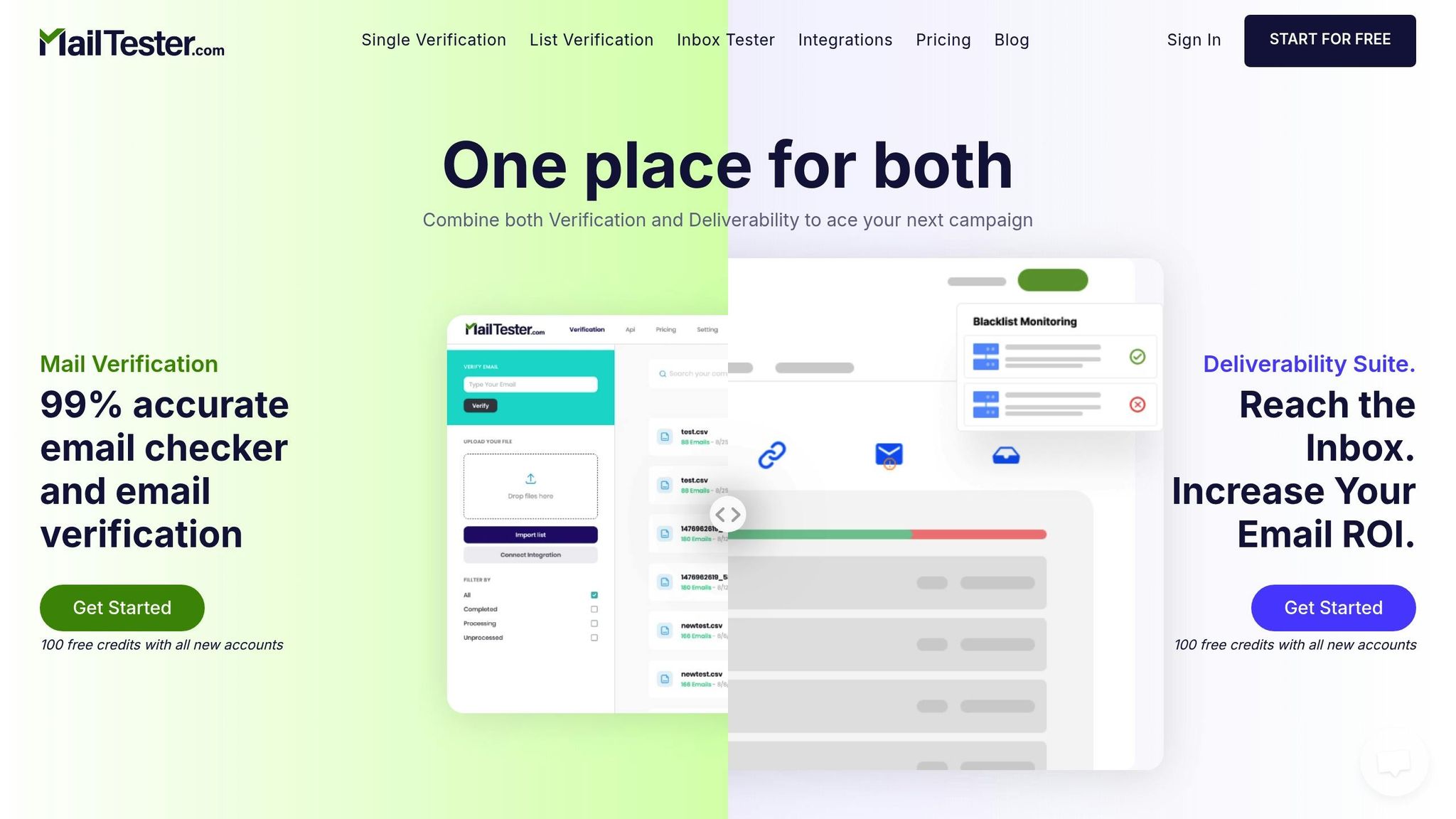
MailTester is a straightforward and budget-friendly tool designed specifically for spam testing. While more comprehensive platforms like Warmforge bundle various deliverability features, MailTester sticks to the basics, focusing on identifying spam risks without the added complexity.
Spam Testing and Filtering Analysis
MailTester examines your email's content, headers, and authentication records to detect potential spam triggers. It looks for common red flags like suspicious keywords, poorly formatted HTML, and missing authentication protocols.
The tool provides actionable feedback on issues that could land your emails in spam folders. It checks critical authentication elements like SPF, DKIM, and DMARC, while also analyzing your email's structure to flag elements commonly associated with spam.
Its reports are clear and easy to understand, focusing entirely on spam-related risks. This makes MailTester a great choice for small businesses or individuals who want quick insights without diving into overly complex data or analytics.
Pricing and Value for Money
MailTester’s standout feature is its affordability, making it an accessible option even though detailed pricing information isn’t widely available.
While it doesn’t offer advanced features like real-time monitoring or in-depth inbox placement testing, MailTester does an excellent job at what it’s built for - spotting spam risks. For users who primarily need a tool for spam analysis rather than full-scale deliverability tracking, its focused approach offers solid value.
Next, we’ll take a closer look at GlockApps and its unique take on deliverability diagnostics.
3. GlockApps
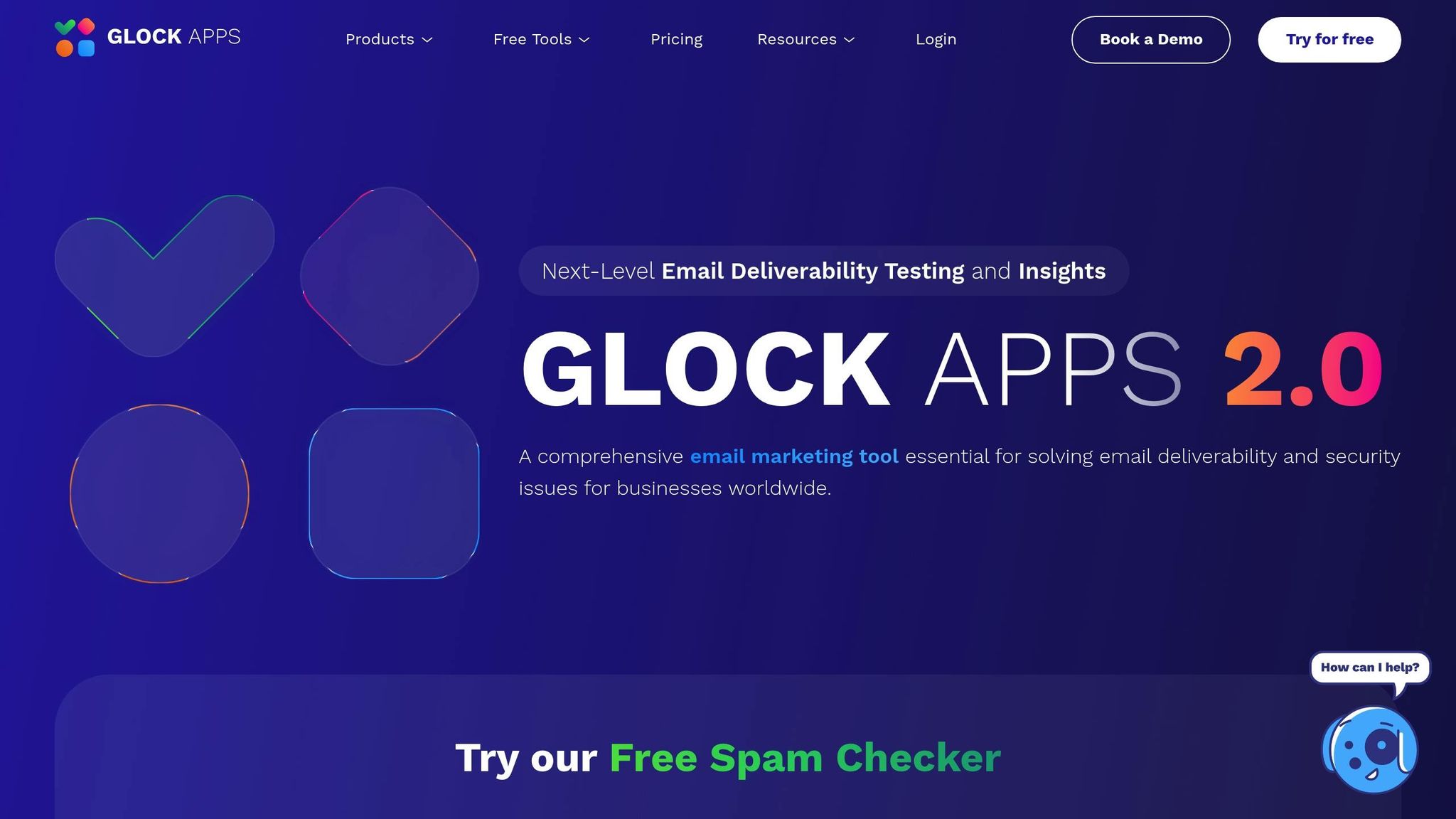
GlockApps stands out as a deliverability testing platform that dives deeper than basic spam checks. It offers a detailed look at various aspects of email health, providing insights that go beyond the surface.
Inbox Placement Testing
With the Inbox Insight tool, GlockApps allows users to conduct thorough inbox placement tests. You can manually set up a spam test by choosing popular spam filters like SpamAssassin, Barracuda, or the Google Spam Filter. It also covers a wide range of email providers, including business, free, and location-specific services. To simulate real-world scenarios, you send your email - tagged with a unique ID - to a seed list of over 100 addresses. For better sender reputation management, splitting the list into groups of 25 is recommended.
Email Deliverability Monitoring
GlockApps doesn’t stop at placement testing. It provides detailed monitoring metrics to help you understand your email's performance. These include inbox, promotions, spam, and block rates, as well as IP and domain analytics like reverse DNS, blacklists, DKIM, and HELO checks. This holistic view ensures you can pinpoint and address deliverability challenges.
Spam Testing and Filtering Analysis
GlockApps also excels in spam and filtering analysis. Its Email Providers Delivery Report breaks down stats by geographical location (Geo View) or ISP (Provider View). For each seed email address, the report shows whether the email landed in the inbox, was flagged as spam, placed in a specific tab, or went missing entirely. Additional insights include sender IP details, SPF authentication results, blacklist counts affecting your sender IP, and delivery timing data to identify throttling issues. You can also dig deeper by reviewing message headers and individual blacklist reports for specific seed addresses.
4. MXToolbox
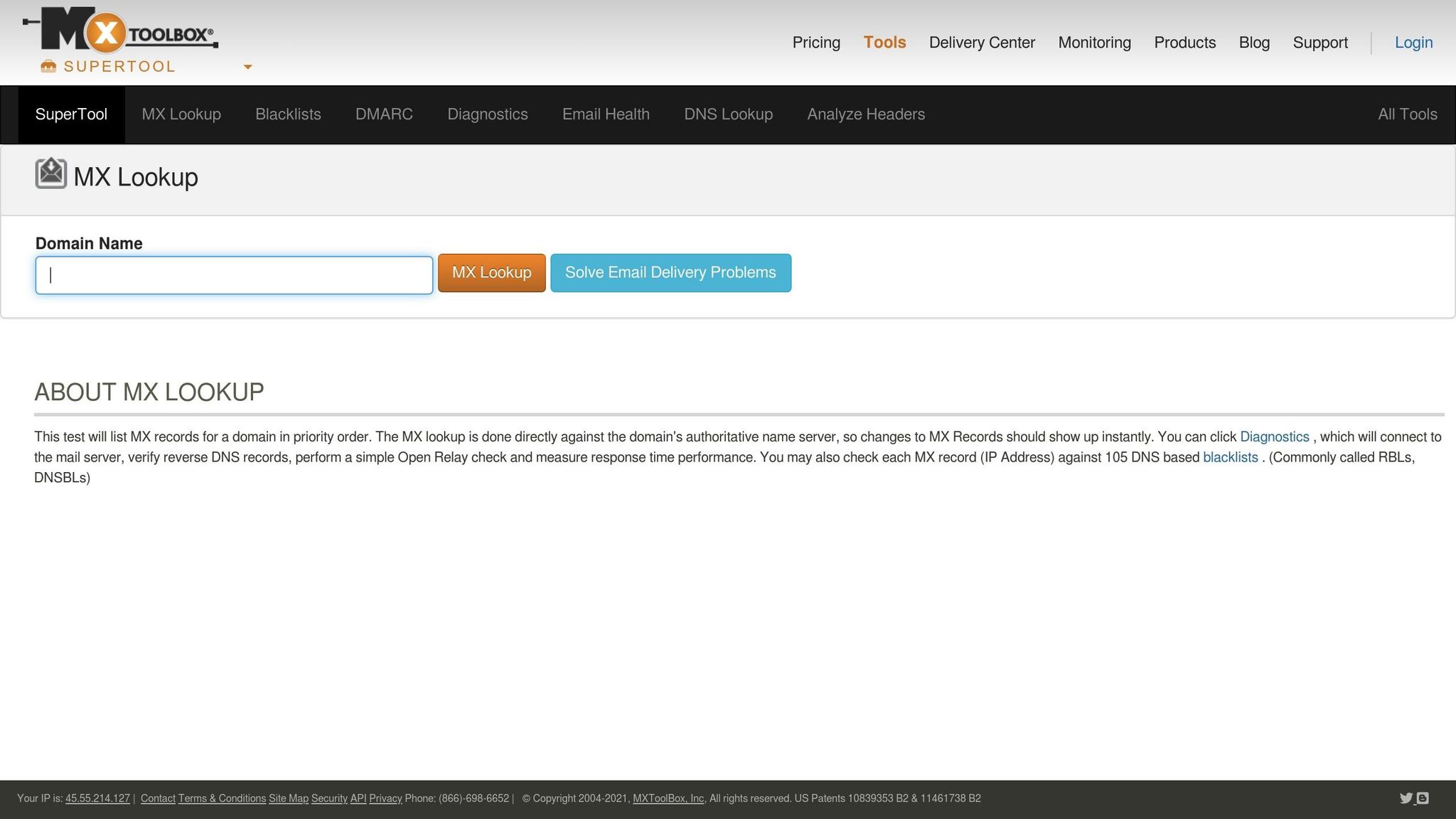
MXToolbox serves as a powerful diagnostic tool, focusing on the technical elements essential for email deliverability. It provides in-depth analysis of DNS records, blacklist statuses, and SMTP configurations, making it a go-to platform for email infrastructure diagnostics.
Email Deliverability Monitoring
One of MXToolbox's standout features is its real-time diagnostics. It continuously monitors blacklist statuses, reviews DMARC data, and sends alerts about reputation changes [7,8]. The platform also ensures that servers and IPs are properly configured while keeping an eye on both inbound and outbound mail flow. To top it off, it delivers detailed performance reports to help users maintain smooth email operations [7,8].
MXToolbox dives even deeper by analyzing spam metrics to help ensure emails land in the inbox rather than being flagged as spam.
Spam Testing and Filtering Analysis
When it comes to spam testing, MXToolbox offers an inbox placement tester that evaluates how emails perform with major providers. However, this feature is limited to just three providers, which might not be as thorough as some competing tools. The platform also checks key email authentication protocols like SPF, DKIM, DMARC, and BIMI. Additionally, it monitors complaints and delivery failures reported by mailbox providers, helping users protect their sender reputation.
Pricing and Value for Money
MXToolbox offers three main pricing tiers:
- Free Plan: Includes weekly blacklist monitoring for one website, making it a practical option for small businesses or individual users.
- MxToolbox Delivery Center ($129/month): This plan provides inbox placement analysis, recipient complaint tracking, email performance reports, configuration analysis, and comprehensive mail flow monitoring.
- MxToolbox Delivery Center Plus ($399/month): Designed for organizations with advanced needs, this tier includes SPF flattening, enhanced email threat tools, domain impersonation protection, and access to dedicated expert support.
- Managed Email Delivery Services: Pricing is available upon request for fully managed DMARC and email delivery support.
While the pricing is reasonable for the features offered, the platform's interface feels outdated and can be challenging to navigate, particularly during searches.
Despite its navigation issues, MXToolbox is a solid choice for organizations that value technical depth and detailed DNS and infrastructure diagnostics over a polished user experience.
Next, we'll take a closer look at MailGenius to see how it stacks up in deliverability diagnostics.
5. MailGenius
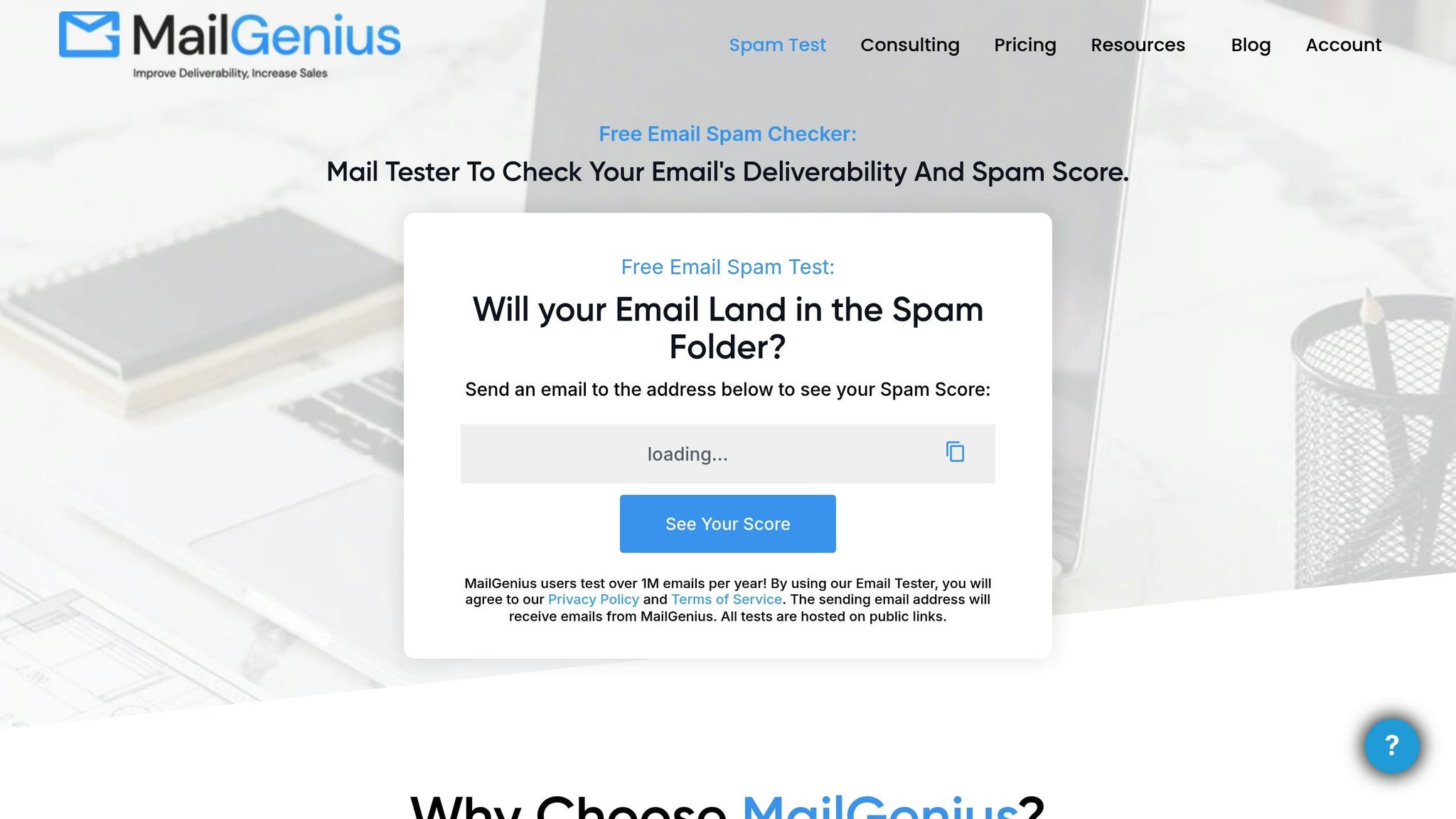
MailGenius is an email testing tool designed to help users analyze spam risks and improve email deliverability. Unlike platforms that focus primarily on diagnosing technical issues, MailGenius offers a broader perspective by combining content analysis, sender reputation checks, and authentication protocol reviews - all within a single, easy-to-use interface.
Spam Testing and Filtering Analysis
MailGenius specializes in content-focused spam testing, offering detailed feedback on how your email content impacts deliverability. It evaluates key elements such as subject lines, the email body, HTML structure, image-to-text ratios, and sender authentication protocols (SPF, DKIM, and DMARC). The result? A detailed spam score that highlights areas for improvement, including sender reputation, content quality, and technical setup.
The platform also tests emails against major spam filters and provides practical recommendations to help users optimize their content. By addressing these issues, marketers can avoid common mistakes that often lead to emails being flagged as spam.
Email Deliverability Monitoring
MailGenius provides on-demand deliverability analysis, allowing users to assess their domain's reputation and predict how emails will perform across different providers. This feature helps identify potential delivery issues before launching campaigns.
That said, MailGenius does not include real-time monitoring or automated services for maintaining sender reputation over time. For businesses needing continuous oversight, platforms like Warmforge - offering ongoing monitoring and automated warm-up services - might be a better fit.
Pricing and Value for Money
MailGenius operates on a credit-based pricing model:
- Free Plan: 3 tests
- Basic: 100 tests/month for $29
- Professional: 500 tests/month for $79
- Enterprise: 2,000 tests/month for $199, including priority support
Additional credits can be purchased as needed, making this pricing structure flexible for businesses with varying email testing needs. For companies that don’t require constant monitoring but do need thorough testing, MailGenius offers an affordable alternative to subscription-based platforms.
With its intuitive design and in-depth reporting, MailGenius is a solid choice for marketers looking for reliable spam analysis without the extra complexity of enterprise-level tools. However, businesses that rely on continuous monitoring and automated reputation management may find more comprehensive solutions elsewhere.
Next, let’s take a look at SendForensics to explore another approach to email deliverability analysis.
sbb-itb-2939cd8
6. SendForensics
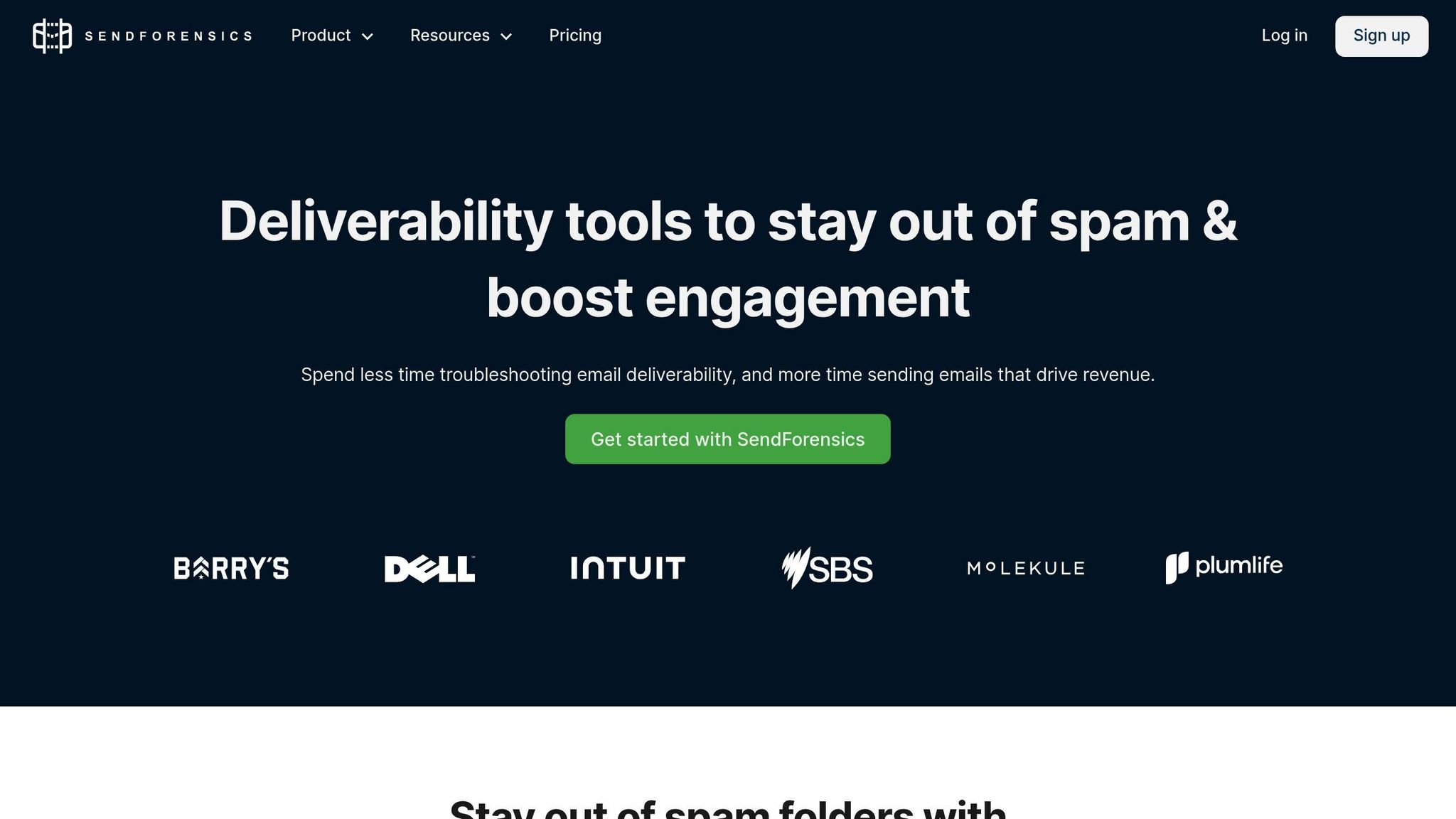
SendForensics leverages AI and advanced infrastructure analysis to identify email deliverability issues that standard spam checkers often overlook. It goes beyond basic spam tests by analyzing email content for problematic words, phrases, and code, while also offering tailored recommendations to improve performance. Additionally, it scans for non-compliant cookies and checks every link - even those with redirects - to detect blacklist signals.
Spam Testing and Filtering Analysis
SendForensics digs deeper than surface-level checks, identifying potential spam triggers that might otherwise go unnoticed. This feature is particularly helpful for businesses using intricate email templates with embedded tracking or personalization elements, as it provides actionable suggestions to refine and improve email content.
Email Deliverability Monitoring
The platform doesn't just stop at content analysis. It identifies hidden infrastructure issues through automated reverse DNS tests, email header reviews, and a thorough inspection of the email's received chain. These insights help users address server problems, verify blacklists, and resolve issues before they impact deliverability.
Inbox Placement Testing
With its seedlist-based inbox placement testing, SendForensics provides clear data on where your emails land - whether it's the Primary, Promotions, or spam folder - across major providers like Gmail, Yahoo, and Outlook. This allows users to see how different providers handle their emails and make targeted adjustments to improve placement.
Pricing and Value for Money
SendForensics offers a Brand Plan starting at $39 per month, which includes unlimited spam tests. However, some users have reported challenges such as complex setup, delays in reporting, and inconsistent support. For those seeking a more user-friendly experience with features like automated warm-up services and continuous monitoring, alternatives like Warmforge might be worth considering.
SendForensics is ideal for users who are technically skilled and need in-depth analysis. However, its complexity and reported support issues might be a drawback for some. Up next, we’ll take a closer look at Postmark DMARC and its focus on email authentication and security.
7. Postmark DMARC

Wrapping up our review is Postmark DMARC, a tool designed to enhance email authentication and domain security. This platform focuses on managing DMARC policies, protecting email domains from spoofing, and providing detailed reports on authentication performance. It simplifies the process by continuously monitoring SPF, DKIM, and DMARC results while alerting users to any unauthorized email activity.
Email Deliverability Monitoring
Postmark DMARC keeps an eye on SPF, DKIM, and DMARC alignment across email streams, notifying you of authentication failures that could affect delivery. The tool provides periodic pass-rate reports but lacks real-time insights at the ISP level. For users of Postmark's transactional email service, this integration offers an easy way to keep tabs on authentication performance.
Pricing and Value for Money
Postmark DMARC operates on a freemium model, with scalable paid plans that cater to small businesses just starting with DMARC. However, its focus is strictly on authentication. If your organization requires a broader email health solution - like inbox placement testing, spam analysis, or automated warm-up services - you might need to consider more comprehensive platforms like Warmforge. While Postmark DMARC is excellent for authentication, it works best as a complementary tool rather than a standalone solution for full email deliverability management.
This platform is ideal for organizations with dedicated IT teams capable of handling other aspects of email deliverability. For those seeking an all-in-one solution with more extensive features, exploring alternative platforms may be a better fit.
Feature Comparison Table
Compare email health tools side by side with this handy table. It highlights each platform's main features, pricing, ideal use cases, and key limitations, helping you decide which tool fits your needs best. This overview sheds light on how each tool adds value to your email deliverability strategy.
| Tool | Key Features | Pricing | Best For | Main Limitations |
|---|---|---|---|---|
| Warmforge | Automated warm-up, AI-based deliverability monitoring, placement tests, health checks, blacklist scanning | ~$3 to ~$12 per mailbox slot per month* (annual billing discounts included); one free warm-up slot per user | Comprehensive email deliverability management with automation | Newer platform with a still-developing feature set |
| MailTester | Spam score analysis, content optimization, authentication checks | Free basic version; premium plans available | Quick spam testing and content analysis | Lacks ongoing monitoring features |
| GlockApps | Inbox placement testing, spam filter analysis, deliverability monitoring | Pricing tiers based on testing volume | In-depth inbox placement insights for major ISPs | Higher costs for comprehensive testing |
| MXToolbox | DNS/MX record analysis, blacklist monitoring, network diagnostics | Free basic tools; Pro plans at higher price points | Technical DNS and infrastructure monitoring | Focuses more on technical setup than full deliverability insights |
| MailGenius | Email content analysis, deliverability scoring, optimization tips | Free basic analysis; premium features available | Content optimization and deliverability scoring | Limited real-time monitoring |
| SendForensics | Advanced deliverability analytics, reputation monitoring, campaign analysis | Enterprise-level pricing (contact for quote) | Large-scale enterprise email operations | Complex setup and enterprise-focused pricing |
| Postmark DMARC | DMARC policy management, authentication monitoring, spoofing protection | Freemium model; paid plans for advanced features | Email authentication and domain security | Limited to authentication-related functions |
*Pricing may vary depending on volume and billing frequency.
Warmforge stands out for its flexible pricing and robust feature set, starting at around $3 per mailbox slot per month (on annual plans) with discounts up to 57%. It even offers a free warm-up slot for every user, making it a cost-effective option compared to competitors.
While tools like Warmforge combine automated warm-up, AI-powered monitoring, and placement testing into a single solution, others focus on specific aspects. For instance, Postmark DMARC specializes in authentication, and MXToolbox excels in technical diagnostics.
For small and medium-sized businesses, Warmforge is an appealing all-in-one solution thanks to its competitive pricing and ease of use. On the other hand, enterprises with dedicated IT teams might prefer specialized tools like SendForensics for detailed analytics or MXToolbox for technical monitoring. However, these tools may require combining multiple platforms to achieve full coverage.
Warmforge also offers a free warm-up slot and a monthly placement test for trial purposes, distinguishing itself from competitors with basic free versions that often come with limited capabilities. This makes it a practical option for businesses wanting to test email health tools before committing to a paid plan.
Conclusion
For budget-conscious users, tools like Warmforge (around $3 per mailbox slot annually, with a free warm-up slot and monthly placement test) or MailTester's free basic version for quick spam checks are solid choices. On the other hand, enterprises might lean toward premium options like SendForensics for advanced analytics or GlockApps for detailed inbox placement testing across major ISPs. To help you decide, compare features, pricing, and your specific needs to find the best tool for your email strategy.
When selecting a platform, align its features with your email challenges. If you’re after a comprehensive solution, Warmforge combines deliverability and warm-up features, saving you from juggling multiple tools. For technical monitoring, MXToolbox stands out with its DNS and infrastructure diagnostics. Companies focused solely on email authentication might find Postmark DMARC ideal for specialized DMARC management.
Small to medium-sized businesses typically benefit from platforms that offer multiple functions in one package. Meanwhile, enterprises with IT teams often prefer specialized tools, even if it means combining several platforms for complete coverage.
Your choice should also reflect your email usage. A startup sending 1,000 emails monthly will have different requirements than an enterprise managing complex, multi-domain campaigns. Factor in your current email volume, deliverability challenges, and growth plans when making a decision.
FAQs
How does Warmforge's AI-powered warm-up service enhance email deliverability compared to traditional methods?
Warmforge's AI-powered warm-up service takes email deliverability to the next level by mimicking real, human-like interactions. It creates natural email activity, including multi-step replies and ongoing conversations, which helps build a solid sender reputation. The result? Your emails are more likely to land in primary inboxes instead of getting flagged as spam.
What sets Warmforge apart is its dynamic, AI-driven approach. Unlike older methods that depend on static or manual processes, Warmforge continuously adapts to maintain consistent engagement. This reduces bounce rates and steadily improves your email deliverability, making it a smarter and more reliable solution for optimizing your outreach efforts.
What should small businesses and large enterprises consider when selecting an email health tool?
When choosing an email health tool, businesses should consider their specific needs based on their size and resources.
For small businesses, the focus should be on tools that are affordable, easy to use, and capable of automating tasks. Features like email warm-up and basic monitoring are particularly helpful for smaller teams working with limited budgets and manpower. These tools simplify email campaigns while ensuring good deliverability without requiring extensive technical expertise.
Large enterprises, however, have more complex requirements. They need tools that provide detailed metrics such as spam reports, engagement tracking, and sender reputation monitoring. Scalability is key, as these businesses often handle high email volumes. Additionally, seamless integration with existing systems is a must to maintain efficiency across their operations.
No matter the size of the business, maintaining strong deliverability, high-quality email lists, and a good sender reputation is crucial. Tools like Warmforge can support both small and large businesses with features such as AI-powered email warm-up, deliverability tracking, and placement testing, helping ensure emails land in the primary inbox where they belong.
Why should you monitor email authentication protocols like SPF, DKIM, and DMARC, and how do they affect email deliverability?
Monitoring email authentication protocols like SPF, DKIM, and DMARC is crucial for ensuring your emails are recognized as legitimately coming from your domain. These protocols play a key role in combating spam, phishing attempts, and email fraud by verifying the sender's identity.
When set up correctly, they enhance email deliverability by minimizing the risk of your messages being marked as spam or rejected altogether. They also safeguard your sender reputation, which is essential for keeping your emails consistently landing in recipients' inboxes. Ignoring these protocols can seriously impact your email performance and weaken your outreach efforts.